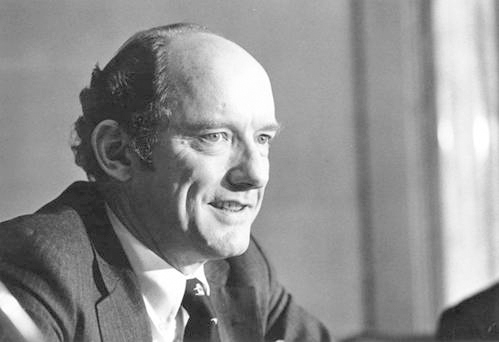Is This Any Way to Run a City’s Schools?
Leaked CTU Proposals Won’t Do Anything to Improve Schools’ Poor Performance

Malcolm Wallop Opposed Compulsory Unionism, Without Fear or Favor
(Source: October 2011 NRTWC Newsletter)
Thirty-five years ago this August, a staunchly pro-Right to Work, but obscure GOP state senator named Malcolm Wallop was running 34 points behind in his challenge to Wyoming three-term U.S. Sen. Gale McGee, a Big Labor Democrat.
Respected pundits didn’t expect the race ever to get close.
But less than three months later, after an extensive National Right to Work Committee campaign had alerted Wyoming citizens about the union-boss power grabs Mr. McGee could help ram through Congress if reelected, Mr. Wallop soundly defeated the incumbent.
As even the Washington Post noticed from afar at the time, the McGee-Wallop race “brought unions and right-to-work groups into direct battle.”
Former Right to Work President: Sen. Wallop Kept His Promises to Constituents
“In a letter he sent out in late August 1976 to Wyoming citizens who had inquired about his stance on compulsory unionism, Malcolm Wallop said forthrightly: ‘I believe in the work of the [National Right to Work] Committee,'” noted former Committee President Reed Larson.
“Mr. Wallop added that he would ‘stand behind the principle’ of Right to Work as a U.S. senator.
“From the time he took his oath of federal office in 1977 to the day he retired from the Senate in 1995, Malcolm Wallop kept his pro-Right to Work promises to his constituents.”
During Mr. Wallop’s first years in the Senate, standing up for the Right to Work meant standing up as a Republican to the Big Labor-favoring policies of Democrat President Jimmy Carter.
In 1977 and 1978, Mr. Wallop successfully opposed the Carter Administration’s so-called labor-law “reform,” which would have used the threat of exorbitant fines to browbeat employers into acquiescing to the forced unionization of their employees.
In the floor debate leading up to one of a record six cloture votes on Mr. Carter’s phony “reform,” Mr. Wallop eloquently summed up why Big Labor was so determined to get this legislation passed.
Union officials, the senator charged, “no longer compete for the minds and loyalty of the workmen of this country. They want them handed to them. They want an indentured situation where they do not have to go out and work for members.”
Mr. Wallop Fought Big Labor Appeasement in Reagan and Bush 41 White Houses
Years later, Mr. Wallop defended the Right to Work with just as much passion when it was being undermined by Big Labor appeasers in his own political party.
In 1979, union-label appointees on the National Labor Relations Board ruled that private-sector employees at the Patrick Air Force Base and Cape Canaveral in Right to Work Florida may be forced to pay union dues, or be fired. The NLRB’s rationale was that these facilities are “exclusive” federal enclaves.
Three years later, Reagan-appointed Solicitor General Rex Lee shocked and disappointed Right to Work supporters when he issued a brief calling on the U.S. Supreme Court to deny review of an appeals court decision upholding the NLRB’s restriction on states’ prerogative to pass Right to Work laws.
“In response to Mr. Lee’s betrayal, Sen. Wallop quickly agreed to sign on to a joint letter to President Reagan from principled Right to Work supporters on Capitol Hill calling on the White House to change course,” Mr. Larson recalled.
“Unfortunately, this effort wasn’t successful, and the NLRB power grab in Lord v. IBEW stands to this day. In other cases, however, Mr. Wallop’s principled stance prevailed.
“In 1991, working closely with Right to Work officers, the senator stopped the George H.W. Bush Administration from appointing forced-unionism ideologue Mary Cracraft to a second five-year NLRB term.”
On September 14, Malcolm Wallop passed away at his ranch home near Big Horn, Wyo. He will be missed by Right to Work supporters everywhere.

Leaked CTU Proposals Won’t Do Anything to Improve Schools’ Poor Performance

Wherever Big Labor wields the power to collect forced union dues, union bosses funnel a large share of the confiscated money into efforts to elect and reelect business-bashing politicians. Employment growth tends to lag as a consequence.

Members Insist They Keep Pro-Right to Work Campaign Promises